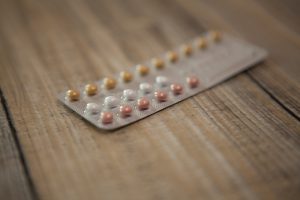How to talk to lesbian and bisexual teens about contraception.

When we talk about teen pregnancy, many of us may assume that we’re only referring to straight / heterosexual girls. It might surprise you to learn that lesbian and bisexual teens are actually between two and four times more likely to get pregnant than straight girls [1][2]. The reasons are complicated: some sexual minority girls feel like they have to ‘prove’ they’re straight. Others may not find sex education to be helpful because it doesn’t speak to issues they care about. It’s also true that one’s sexual identity and one’s behavior don’t always match up – particularly in adolescence when it is normal to experiment sexually.
The pregnancy statistics make it clear that we need to talk to lesbian and bisexual teens about birth control. For many of us contraception is a Big Topic that often gets avoided. But our teens can’t afford for us to be afraid to talk about it. To help start this conversation it’s important to understand the unique experiences and challenges of LGB teens. Here are some things to remember:
1. Sexual Identity does not always predict Sexual Behavior.
Sexual Identity refers to romantic or sexual attractions. Sexual Behavior refers to the actual sexual acts a person may engage in. Sometimes these two line up; sometimes they don’t.
Adolescence is a time of sexual development and maturation. Many teens explore their emerging sexual feelings to help them understand and define their sexual identities [3]. A teen girl might identify as lesbian or bisexual, and experiment with guys to test whether her attractions and feelings are ‘real’ or even simply because she wants to. Either way, this is totally normal.
Since one in five lesbian teens and four in five bisexual teens have had a recent male partner [3] it is useful to emphasize to sexual minority girls that it only takes one time to get pregnant. Talking about the emergency contraception pill with all teens is an important way to give them the tools they need if they weren’t planning on it and had unprotected sex.
2. Peer pressure is REAL.
Peer pressure is a real influence on teen behavior. All adults were in high school once, so we know that social pressure is a thing. Some sexual minority girls may feel pressure to have sex with guys to ‘prove’ to their friends, family, or themselves that they are straight. They might also be trying to fit in to avoid being bullied, excluded from their friend groups, or otherwise not being part of the in-crowd.
3. Contraception can be used for more than Pregnancy Prevention.
Other reasons lesbian and bisexual teens might consider contraception are not related to sexual activity at all. Many teens use contraception to regulate periods, minimize symptoms of periods (like cramping), or even to relieve acne [4]. Lesbian and bisexual teens may want to consider contraception for these additional health benefits, especially if they don’t think they will ever have sex with a guy.
Ultimately, there are lots of reasons lesbian and bisexual teens may discover that birth control is a good fit for them. They may not think about it though, unless we bring it up. Sometimes one conversation can make all the difference, so let’s start talking!
Learn more about our research at Center for Innovative Public Health Research.
Find us on Google+, Twitter, and Facebook.
Acknowledgments: Thank you to Chantel Gammage for her contributions to this blog.
References:
[1] Saewyc E, Bearinger L, Blum R, Resnick M. Sexual intercourse, abuse and pregnancy among adolescent women: Does sexual orientation make a difference? Family Planning Perspectives. 1999;31(3):127-131.
[2] Saewyc E. Adolescent pregnancy among lesbian, gay and bisexual teens. In: Cherry A, Dillon ME, eds. International Handbook on Adolescent Pregnancy. New York, NY: Springer Science+Business Media; 2014:159-169.
[3] Ybarra ML, Rosario M, Saewyc E, Goodenow C. Sexual behaviors and partner characteristics by sexual identity among adolescent girls. Journal of Adolescent Health. 2016;58(3):310-316.
[4] Noncontraceptive Benefits of Birth Control Pills. In: Medicine ASfR, ed2011.
